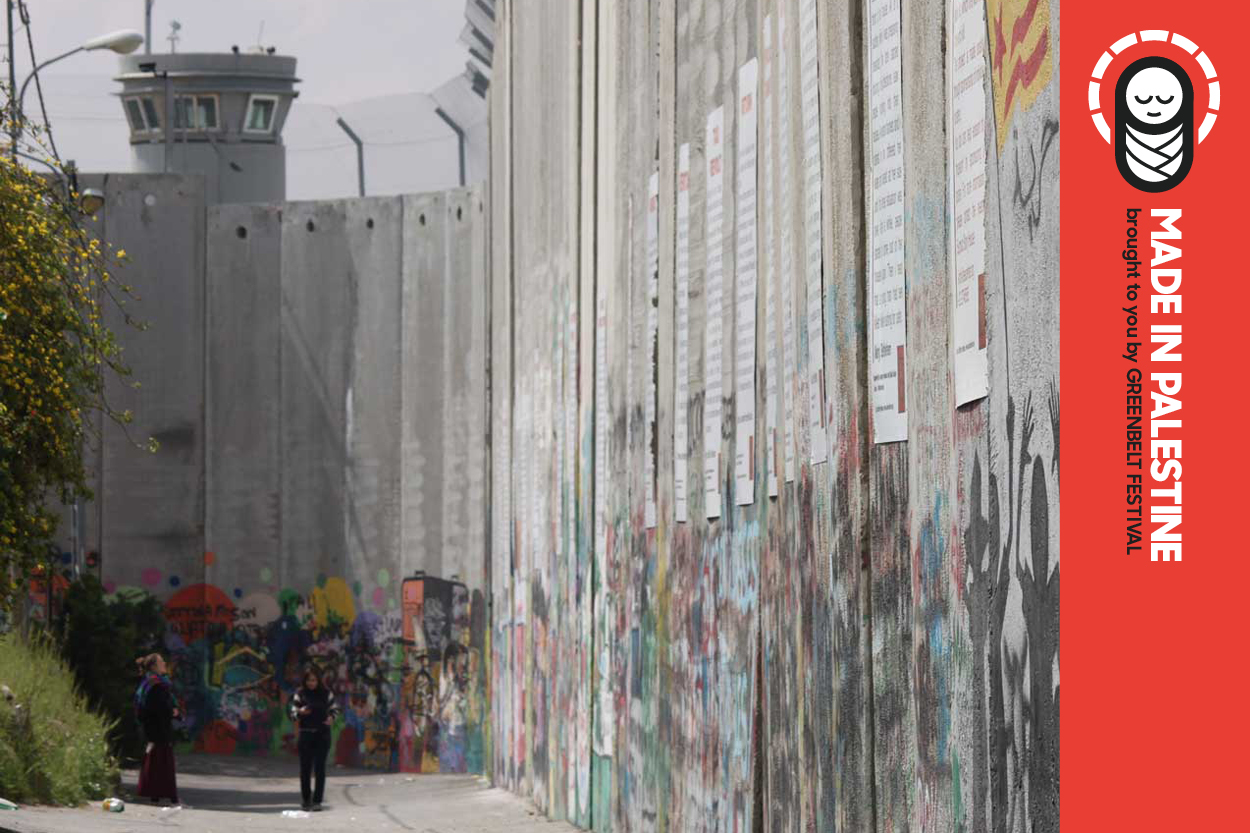When there are so many global injustices Greenbelt could focus on, why do we make such a big deal about peace, justice and equal rights in modern-day Israel-Palestine? It’s a question we get asked a lot (understandably, when there is so much need, suffering and injustice in the world).
Partly, it’s knowing our limitations and who we are. We’re not an NGO. We do not have the skills or capacity to be involved as an organisation wherever there is need. But we do have a hunger for justice. So we partner with others – like Christian Aid – whose work it is to meet need, alleviate suffering and tackle injustice globally.
Meanwhile, we focus on making spaces where artistry, activism and belief can meet (and mix). And we do that through a progressive Christian lens. This means that our old, old, sacred stories are the ones found in the Bible, a library of books birthed in the Middle East, mostly in and around what is modern-day Israel-Palestine. It’s where it all began.
That’s not to suggest we read that collection of sacred writing literally or as precise historical record. Rather, we read it imaginatively and with liberation in mind. Where the Bible contains four gospels, intuitively and experientially we would want to add more that have been written and lived across time and space – even if they are not collected in the original canon.
In particular, the Land once called Holy is a gospel in itself that requires reading as much as any other. Not in the sense of revisiting the ‘Holy Sites’ on a whistle-stop coach tour of the pre-packaged history of the Bible’s greatest hit locations (‘Now That’s What I Call Biblical’). Instead in the sense of paying attention to and listening closely for the voices of the Living Stones – the people embodying dignified, committed and creative resistance, working, yearning, and praying for peace and justice there today. Ongoing incarnation.
Because of this potent mix of belief, yearning and geopolitics, Israel-Palestine holds us in thrall. Especially the story of the Palestinians which, from every perspective, seems to have been marginalised, trivialised and ignored within the church, within wider culture, and at an international and political level.
In making spaces where arts, faith and justice come together, we’re committed to platforming people and stories not often or usually heard in the mainstream; to curating encounters that might – just might – change all those involved. Bringing the story of the Palestinians into the heart of our festival is one way in which we do that.
We’re also acutely aware, as a community rooted in the UK, of our own particular entanglement in the seemingly intractable situation we see in Israel-Palestine today. It was our British-backed Balfour Declaration in 1917 – promising so much to so many and delivering so little to everybody – that sealed the fate of the Palestinians, now living under occupation in lands they have lived on and farmed for centuries.
And then there was – and still is – the global community’s rightful and just desire to see the world’s Jewish communities given the opportunity to make a safe home together, in the face of centuries of horrific and unrelenting persecution and prejudice; a desire whose energy was driven by the age-old idea that a people without a land might be given a land without a people. Forgetting, in this instance, that there were already a people living in Palestine. The Palestinians.
Greenbelt has become more visible and vocal in its spotlighting of the Palestinian cry for justice over the years. Especially since the 2009 Kairos Document, a Cry for Hope, in which the Christian leaders of Palestine called out to the global Christian community – and beyond – to lobby for an end to Israeli occupation as the starting point for a just solution to the conflict.
There have, of course, also been the tricky waters of anti-semitism to navigate: being careful not to conflate the actions of the Israeli State and Government with a wider suspicion of, or even prejudice against, Jewish people, whether in Israel or the diaspora more widely.
We’ve written about Palestine for years. We’ve platformed Palestinian artists, activists and faith leaders for years. We’ve taken trips to Palestine, together with our friends at Amos Trust, for years. We’ve supported arts-based creative initiatives in Palestine – like the Bet Lahem Live festival in Bethlehem and the Palestine Music Expo in Ramallah – for years. And to this day Palestine continues to be one of our key justice commitments (alongside climate emergency, global people migration – refugees and asylum seekers, and UK poverty and division).
And so, at Christmas time, what is more natural than to revisit the gospel accounts in the light of the fifth gospel: the one that is still being written through the lives and stories of those living and struggling for justice in the land today?
We hope you can join us this Advent as we get underneath the Victorian veneer of our favourite carols to search for contemporary meaning from the facts on the ground in the ‘little town’ behind the Separation Wall, in the occupied West Bank today. Our Made in Palestine Christmas series is a timely reminder that hope is still being born in Bethlehem today. Against all the odds.
More links and resources
Palestine Music Expo 2019: Hope and Creativity
Creative Director Paul on PMX 2019
Hope Is Still Being Born In Palestine
Greenbelt’s Programme Manager, Katherine at the first Palestine Music Expo
Seven Words From The Holy Land
Greenbelt Trustee, Ben Solanky reflects on his visit
Peacemaking in Palestine
Greenbelt volunteer Paul Clark volunteers with the EAPPI peace-making teams

